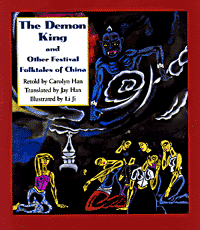There’s always a party to be had here in Hawaii–always something to celebrate. It doesn’t hurt that so many different ethnic holidays and festivals have been adopted by the general population as a part of local culture. One of those is Chinese New Year, which happened to also fall on Valentine’s Day this year! Per usual, Honolulu’s Chinatown was awash in a sea of people enjoying the food and festivities to usher in the Year of the Tiger!
That’s wh y when I saw The Demon King and Other Festival Folktales of China (University of Hawaii Press, 1995) by Carolyn Han, I thought it was fitting to mention it. I found this book in the children’s section but really, who doesn’t love a hearty folktale? That’s the great thing about folklore– it’s of the people, for the people with an audience that encompasses all age groups, social status and experiences. Chinese folklore, much like Hawaiian myth, differs by region with similar stories having different character names or changes in events. Since folktales belong to the people who tell them, stories are changed to reflect the needs of the community… and why unadapted tales can reflect a lot about the way certain groups of people live or lived.
y when I saw The Demon King and Other Festival Folktales of China (University of Hawaii Press, 1995) by Carolyn Han, I thought it was fitting to mention it. I found this book in the children’s section but really, who doesn’t love a hearty folktale? That’s the great thing about folklore– it’s of the people, for the people with an audience that encompasses all age groups, social status and experiences. Chinese folklore, much like Hawaiian myth, differs by region with similar stories having different character names or changes in events. Since folktales belong to the people who tell them, stories are changed to reflect the needs of the community… and why unadapted tales can reflect a lot about the way certain groups of people live or lived.
The Demon King and Other Festival Folktales of China highlights four different tales from minority villages in China. What makes this book different from any mere collection of folklore is that it recants the charming and entertaining tales that inspired various festivals throughout China. After each tale there’s the history of the festival and even how it’s still celebrated today. For example, don’t miss the story of the kindly farmer from the village of Hani in “The Legend of Ni Chi” which is the legend behind the Hani New Year Festival (it’s funny though because the Hani New year is celebrated in October, so really we could just have new year celebrations all year round!) Also check out “Dr. Yuto and the Wild Rat Star”, the tale that inspired the Xizang Bathing Festival…which sounds like it’d be a lot of fun. It’s tremendous that these legends have still survived and that the festivals they inspired are still celebrated. It kind of makes you think about the things we celebrate and why.
If you’re interested, here’s a nice list of Chinese folk stories compiled by Ashliman, famed folklorist. *Remember what I mentioned about adapted/edited versions of folktales…parents and educators should use caution when using adapted tales to teach children about different cultures. Taking certain things out or replacing them with other things in order to make the stories understandble, can sometimes alter the meanings of the tales or their cultural significance. Also, you should always check the sources of anyone relaying a “folktale” online. 😉




